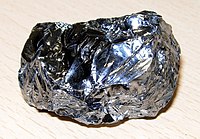
Photo from wikipedia
Abstract Mesoporous bioactive silicate-based glasses in the system of (38-x)CaO–xZnO–58SiO2– 4P2O5 (mol.%), where x varies between 0 and 20, have been prepared by the sol–gel method. The influence of zinc… Click to show full abstract
Abstract Mesoporous bioactive silicate-based glasses in the system of (38-x)CaO–xZnO–58SiO2– 4P2O5 (mol.%), where x varies between 0 and 20, have been prepared by the sol–gel method. The influence of zinc addition on glass physicochemical properties, degradability and apatite- formation ability was comprehensively investigated. The nitrogen adsorption/desorption results confirmed the glasses mesoporous structure. The degradability of glass was studied in Tris–HCl, the addition of zinc would lead to a decrease. Furthermore, the glass apatite-formation ability was assessed by immersion of samples in simulated body fluid (SBF) solution for up to 7 days. The changes in glass surface morphology and composition were detected using X-ray diffraction (XRD), scanning electron microscopy with energy dispersive X-ray spectroscopy (SEM-EDS) and fourier transform infrared spectroscopy (FTIR). It was observed that the apatite precipitation rate slowed down with the increase of zinc, suggesting that the incorporation of zinc could be a promising route to regulate the dissolution and apatite formation of silicate-based glasses.
Journal Title: Journal of Non-crystalline Solids
Year Published: 2018
Link to full text (if available)
Share on Social Media: Sign Up to like & get
recommendations!